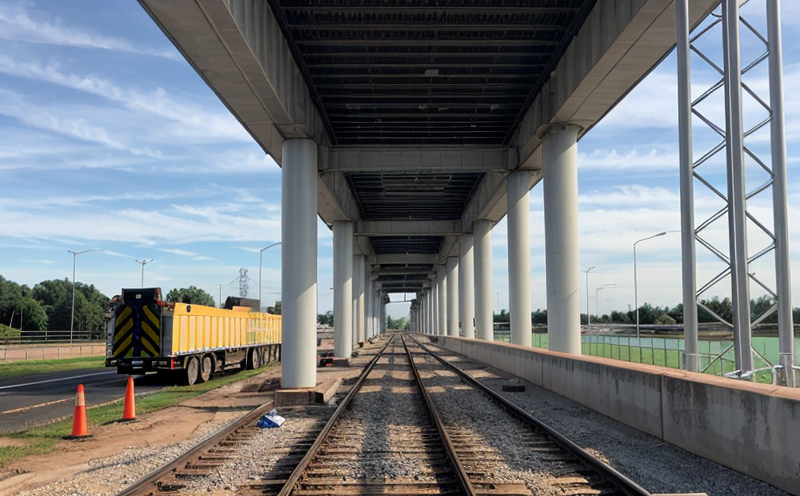EN 13108 Bituminous Mixtures Composition and Testing
The European Standard EN 13108 is a comprehensive framework that specifies methods for the determination of bitumen content, mineral aggregate composition, and overall quality parameters of bituminous mixtures. This standard is particularly crucial in the building & infrastructure testing sector where ensuring the structural integrity and longevity of pavement structures is paramount.
EN 13108 serves as a cornerstone for assessing the performance of bituminous mixtures used in road construction, airport pavements, and other heavy-duty infrastructure projects. The standard mandates rigorous tests to evaluate the suitability of materials based on their chemical composition, mechanical properties, and durability. The testing process is designed to provide reliable data that can inform decision-making regarding material selection and pavement design.
The methodology outlined in EN 13108 involves several key steps including sample preparation, extraction processes for bitumen, determination of aggregate content using sieve analysis, and evaluation of the overall mixture properties. The standard also emphasizes the importance of reproducibility and accuracy, which are critical factors in ensuring consistent results across different testing laboratories.
The European Committee for Standardization (CEN) has recognized EN 13108 as a vital tool for maintaining quality standards in bituminous mixtures, thereby contributing to safer and more sustainable infrastructure projects. This service is essential for compliance with international regulations and ensures that materials meet the required performance criteria.
For stakeholders involved in construction and infrastructure testing, this standard provides clarity on how to conduct precise tests and interpret results accurately. Compliance officers can leverage EN 13108 to ensure regulatory adherence, while R&D engineers benefit from its detailed guidelines for material development. Quality managers use the standard to control the quality of materials entering their supply chain.
Scope and Methodology
The scope of EN 13108 encompasses a wide range of bituminous mixtures used in various applications within building & infrastructure sectors. This includes hot-mix asphalt, chip seal materials, and other types of pavement mixes. The standard defines the procedures for determining the following parameters:
- Bitumen content
- Mineral aggregate composition
- Density of bituminous mixtures
- Flow properties
- Residual stability
- Flexibility and resilience modulus
The methodology involves several critical steps:
- Sample Preparation: The samples are prepared according to the standard's prescribed procedures. This includes sieving aggregates, mixing bitumen with aggregate, and ensuring homogeneity.
- Extraction of Bitumen: Various techniques such as Soxhlet extraction or steam distillation are used to extract bitumen from the mixture.
- Sieve Analysis: Aggregates are sieved using standard sieve sizes to determine their gradation and particle size distribution.
- Density Measurement: The bulk density, apparent relative density, and true relative density of the mixtures are measured.
- Flow Testing: The flow number is determined to assess the workability of the mixture during paving operations.
- Residual Stability Test: This test evaluates the resistance of the mixture to permanent deformation under load.
The results from these tests are then analyzed to provide a comprehensive understanding of the bituminous mixtures' performance characteristics. These parameters are crucial for ensuring that the materials used in infrastructure projects meet the required specifications and contribute to long-lasting pavement structures.
Industry Applications
| Application | Description |
|---|---|
| Road Construction | Ensures the quality of asphalt mixtures used in road construction. |
| Airport Pavements | Maintains the integrity and durability of airport runways and aprons. |
| Bridge Deck Rehabilitation | Evaluates bituminous materials for use in refurbishing or replacing bridge decks. |
| Pavement Maintenance | Assists in the selection of appropriate materials for maintenance activities. |
| New Construction Projects | Sets benchmarks for new construction projects to ensure compliance with international standards. |
- Road Construction: Ensures that the asphalt mixtures used in road construction meet the required specifications, contributing to safer and more durable roads.
- Airport Pavements: Maintains the integrity and durability of airport runways and aprons, which is critical for safe operations and passenger comfort.
- Bridge Deck Rehabilitation: Evaluates bituminous materials suitable for refurbishing or replacing bridge decks, ensuring that these structures are resilient to environmental conditions.
- Pavement Maintenance: Assists in the selection of appropriate materials for maintenance activities, helping to extend the life of existing pavements and reduce maintenance costs.
- New Construction Projects: Sets benchmarks for new construction projects to ensure compliance with international standards, thereby promoting high-quality infrastructure development.
The application of EN 13108 in these sectors is essential for maintaining the quality and durability of bituminous mixtures. This ensures that materials used meet stringent performance criteria and contribute to safer and more sustainable infrastructure projects.
Environmental and Sustainability Contributions
The application of EN 13108 in building & infrastructure testing plays a significant role in promoting environmental sustainability. By ensuring that bituminous mixtures meet stringent quality standards, the standard contributes to the following:
- Pavement Durability: Longer-lasting pavements reduce the need for frequent maintenance and replacement.
- Energy Efficiency: High-quality materials contribute to more efficient road surfaces, reducing vehicle fuel consumption.
- Resource Optimization: Precise testing ensures that resources are used optimally, minimizing waste and environmental impact.
- Material Recycling: The standard supports the use of recycled materials in bituminous mixtures, promoting a circular economy approach to infrastructure development.
In addition to these benefits, EN 13108 also helps in reducing noise pollution from road traffic by contributing to smoother and more resilient pavements. This contributes to better living conditions for communities near roads and highways.
The European Committee for Standardization (CEN) recognizes the importance of sustainability in infrastructure development, and standards like EN 13108 play a crucial role in promoting this goal. By adhering to these standards, stakeholders can contribute to more sustainable urban environments and promote long-term environmental benefits.





